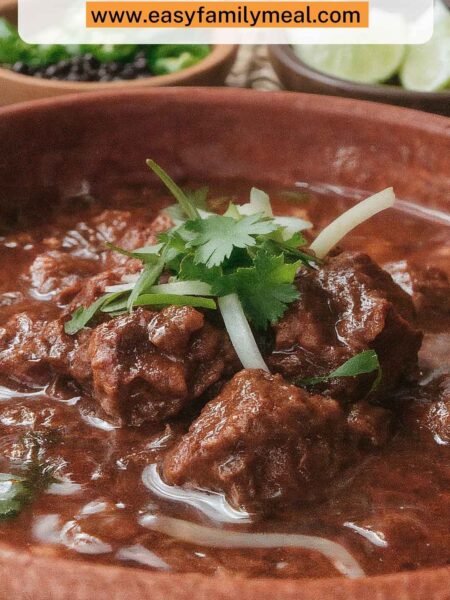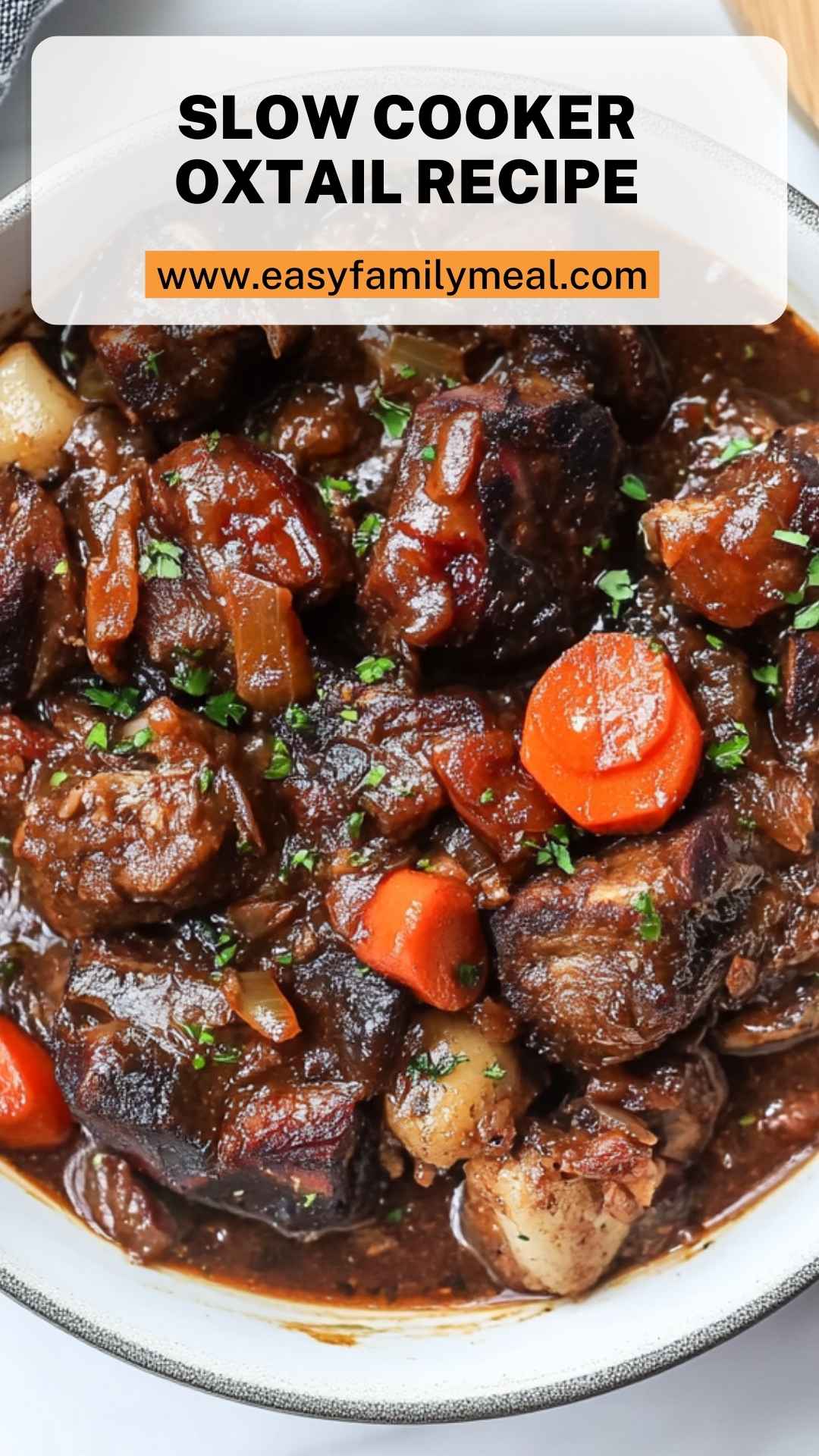Easy slow-roasted beef tenderloin is a showstopper on its own, but when paired with the right sides, it becomes a truly unforgettable meal.
Creamy mashed potatoes are an ideal companion; their buttery richness complements the beef’s robust flavor, creating a perfect balance. Roasted vegetables, like carrots, Brussels sprouts, and asparagus tossed in olive oil and sea salt, add texture and a slight sweetness that enhance the tenderloin’s savory profile.
A fresh arugula salad with a light vinaigrette brings a refreshing contrast, offering a crisp bite to balance the richness of the beef. For an indulgent touch, garlic bread is an irresistible choice. The toasted bread, slathered in garlic butter, is perfect for mopping up those delicious beef juices.
And to round it all off, a glass of red wine, like a smooth Pinot Noir or a bold Cabernet Sauvignon, elevates the flavors of the tenderloin, making each bite even more enjoyable. These pairings create a harmonious and elevated dining experience that complements the slow-roasted beef tenderloin beautifully.
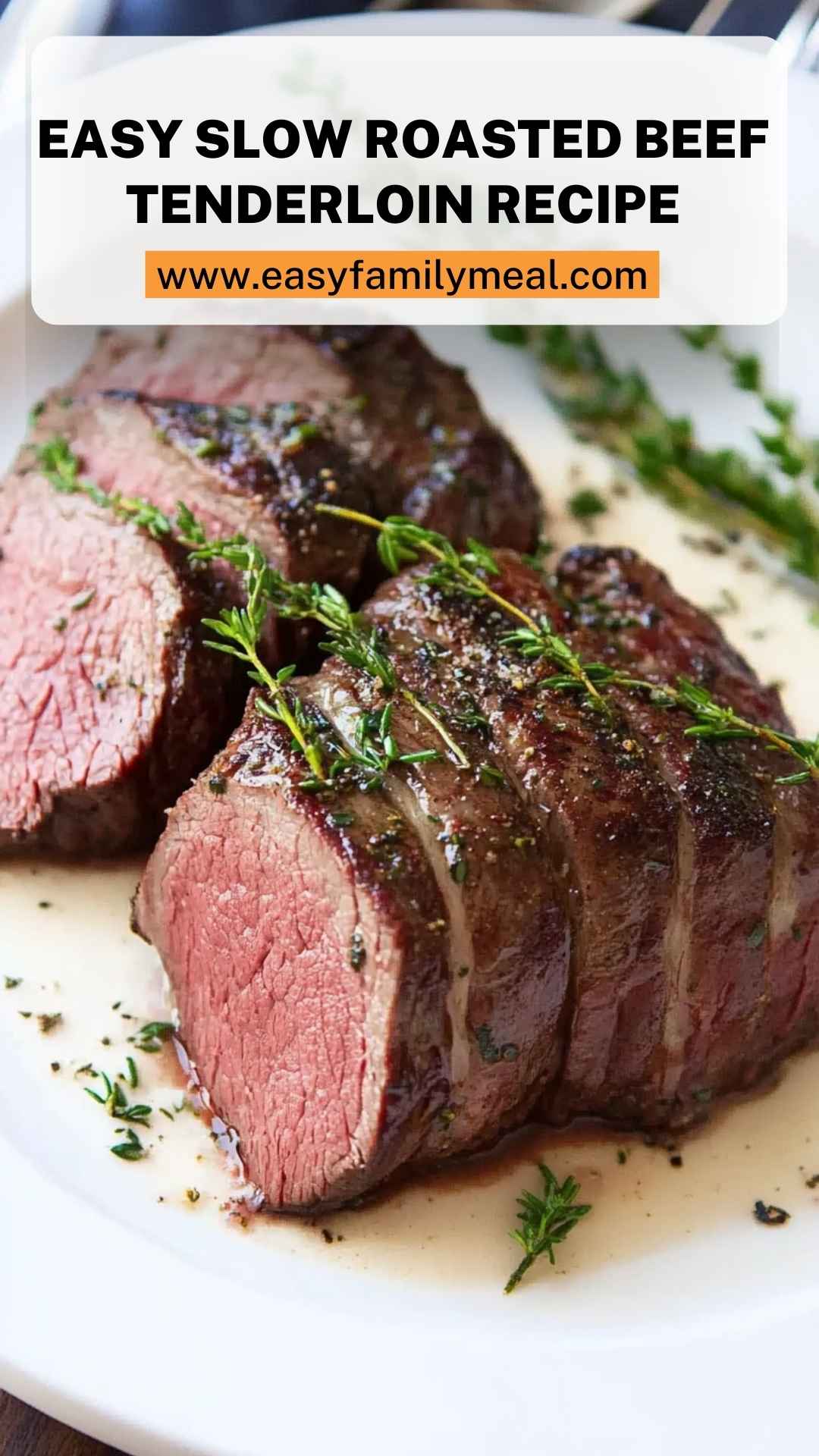
What is Easy Slow Roasted Beef Tenderloin?
Easy slow roasted beef tenderloin involves roasting a well-trimmed center-cut piece of beef at a low temperature for an extended period. This method allows the meat to cook evenly, producing a tender, juicy result that almost melts in your mouth. The slow roasting method requires minimal hands-on time and offers a huge reward for the effort spent.
The key ingredients infuse flavor throughout, making every slice a delightful experience.
How Does It Taste Like?
Imagine carving into a tender piece of meat, the juices pooling slightly on the plate. The first bite bursts with flavor, a combination of savory ghee, subtle mustard, and the earthy essence of fresh rosemary.
Additional notes come from flaked sea salt sprinkled on top, enhancing each morsel. The beef’s richness is perfectly balanced by the creamy horseradish sauce, leaving a remarkable impression on the palate.
Why You’ll Love This?
This dish brings versatile goodness to your table. It’s:
- Effortless: With minimal steps, it doesn’t demand constant attention.
- Flavorful: Simple yet rich flavors shine through without fuss.
- Impressive: Serving a perfectly cooked tenderloin garners admiring glances.
- Customizable: You can adjust the herbs or accompany it with varied sauces based on personal tastes.
Ingredients
Here’s what you need for easy slow roasted beef tenderloin:
- 1 small shallot, roughly chopped
- Kosher salt and freshly cracked black pepper, to taste
- 1 center-cut beef tenderloin (2 to 3 pounds), trimmed
- 4 sprigs fresh rosemary
- 4 tablespoons unsalted ghee
- 1 tablespoon Dijon mustard
- Flaked sea salt, for finishing
- Freshly chopped tarragon, for garnish
- 1 recipe Horseradish Cream Sauce, for serving
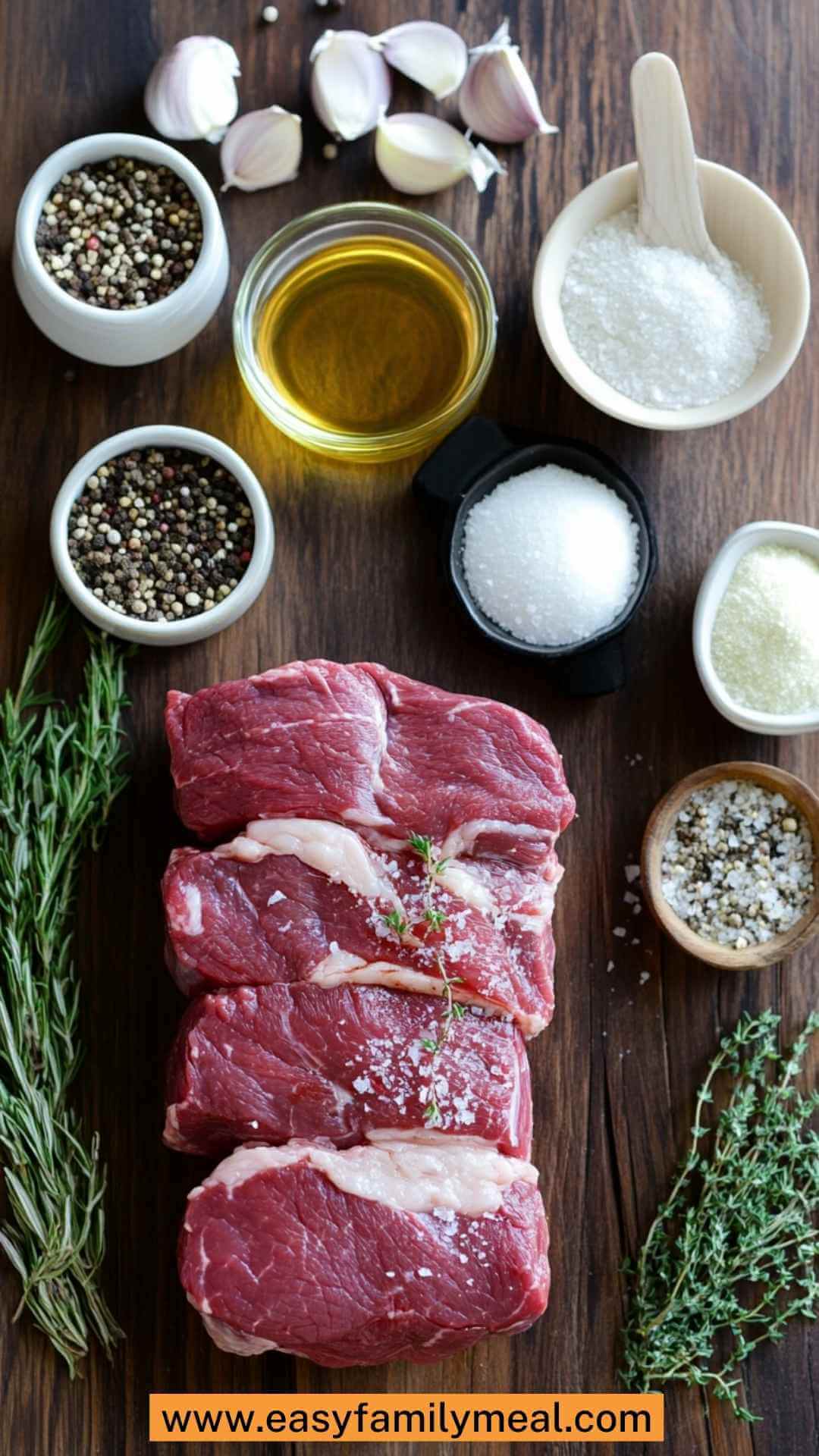
Step by Step Directions
Step 1: Preheat Your Oven
Begin by preheating your oven to 250°F (120°C). A lower temperature is key for that melt-in-your-mouth texture.
Step 2: Prepare the Beef Tenderloin
Trim any excess fat from the beef tenderloin. This not only prevents flare-ups in the oven but also ensures the beef doesn’t turn greasy. Season generously with kosher salt and black pepper to enhance flavor.
Step 3: Sear the Beef
In a large skillet or cast-iron pan, heat 2 tablespoons of ghee over medium-high heat. Once melted, add the tenderloin. Sear on all sides until golden brown, about 2-3 minutes per side. This step is crucial as it locks in juices and adds depth of flavor.
Step 4: Add Shallots and Rosemary
Once the tenderloin is seared, remove it from the heat. Add the chopped shallots and rosemary sprigs around the beef in the skillet. The shallots will cook and impart sweet flavor during roasting.
Step 5: Coat with Mustard and Ghee
Brush the tenderloin with Dijon mustard, then drizzle the remaining ghee over it. This not only enhances the taste but also helps create a lovely crust.
Step 6: Roast in the Oven
Transfer the skillet to the preheated oven. Roast the beef tenderloin slowly until it reaches an internal temperature of 125°F (52°C) for medium-rare. This usually takes about 1 to 1.5 hours, depending on the thickness of the meat.
Step 7: Rest the Meat
After roasting, remove the beef from the oven and allow it to rest for at least 15-20 minutes. Resting is vital; it helps redistribute the juices, ensuring each bite is juicy and tender.
Step 8: Slice and Serve
When ready, slice the tenderloin into medallions. Serve this delicious roast with flaked sea salt, freshly chopped tarragon, and your homemade horseradish cream sauce.
Tips on Making Easy Slow Roasted Beef Tenderloin
- Choose the Right Cut: Selecting a good quality center-cut beef tenderloin ensures better flavor and texture.
- Use a Meat Thermometer: Avoid overcooking by keeping an eye on the internal temperature.
- Low and Slow: Resist the urge to crank the heat; patience is your friend for this recipe.
- Resting is Key: Always let the meat rest before slicing to maintain moisture.
- Experiment with Flavors: Incorporate different herbs like thyme or garlic for variety.
How Do You Store This Easy Slow Roasted Beef Tenderloin?
If you have leftovers (which is rare, but it happens!), here’s how to store them:
- Cool Completely: Allow the beef to cool down to room temperature before storing.
- Wrap Tightly: Use plastic wrap or aluminum foil to wrap slices tightly. You want to minimize air exposure to prevent drying out.
- Refrigerate: Keep it in the fridge and consume within 3-4 days.
- Reheat Gently: To warm, place in an oven preheated to 250°F (120°C) until heated through without compromising texture.
What Other Substitutes Can You Use in Easy Slow Roasted Beef Tenderloin?
If you’re looking to get creative or make adjustments, consider these options:
- Pork Tenderloin: Great alternative with similar cooking methods, though it has a milder flavor.
- Lamb Loin: Offers a unique taste; just adjust seasoning to complement the meat.
- Chicken Breast: Use boneless, skinless chicken breasts. Keep cooking time in check to avoid dryness.
- Plant-Based Options: Portobello mushrooms can offer a hearty, meaty texture for vegetarians.
- Roast Beef: Use a cheaper cut like chuck or round. Just be prepared for a different cooking time and resulting texture.
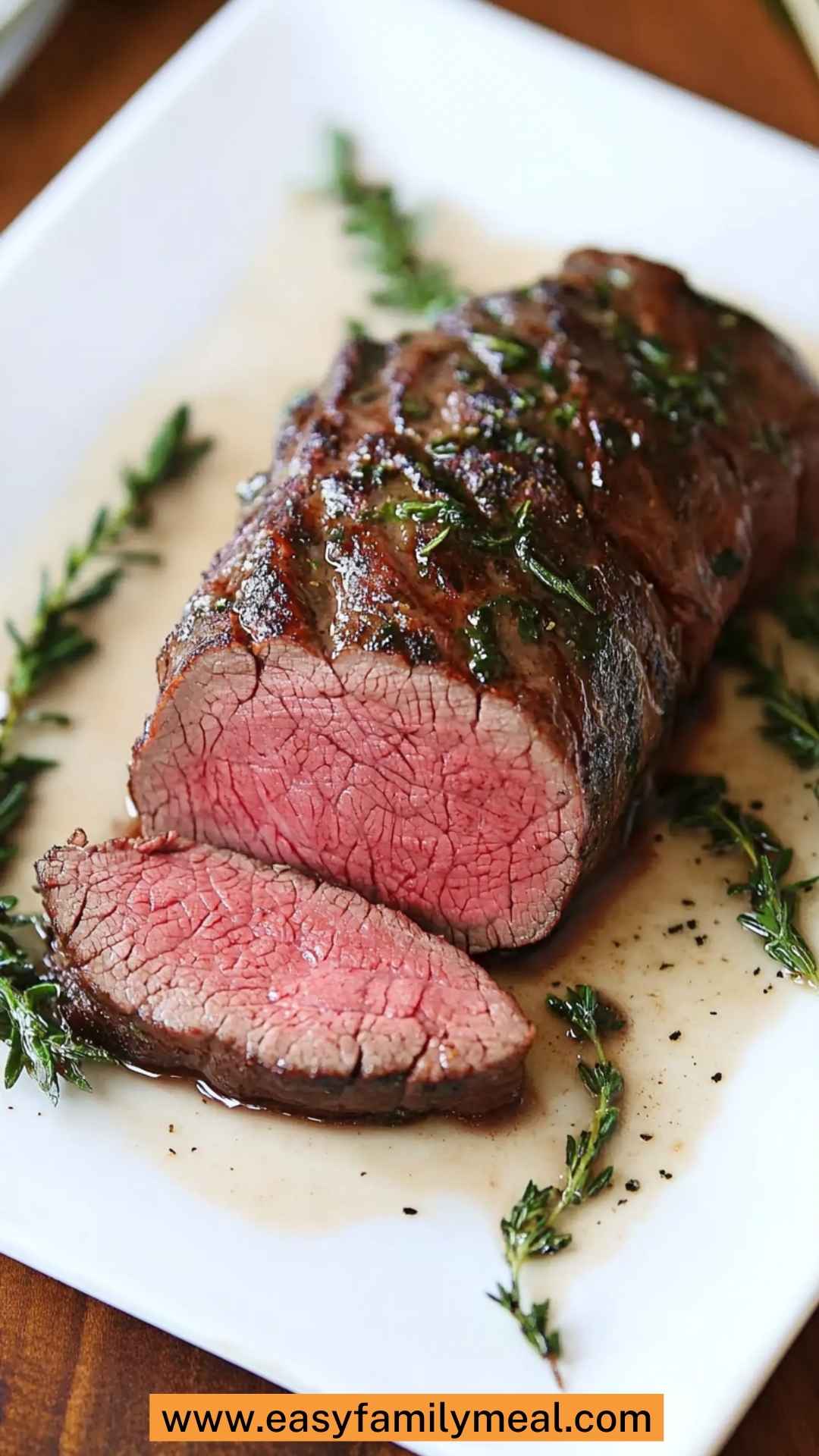
Conclusion
Easy slow roasted beef tenderloin stands as a testament to the beauty of less-is-more cooking. When prepared thoughtfully, it delivers extraordinary flavors with straightforward ingredients. Perfect for gatherings or a quiet night at home, this dish will undoubtedly earn its spot as your go-to roast.
The journey from a simple cut of meat to a gourmet plate is a fantastic endeavor anyone can achieve. Now grab your ingredients, roll up your sleeves, and take your cooking experience up a notch.
You’ll be rewarded with both delicious food and joyful memories around your dining table.
You’ll also like the following recipes!
- Perfect Prime Rib Roast Copycat Recipe
- How to Make Quick Potluck
- Best Easy Vegetable Fried Rice Recipe With Egg
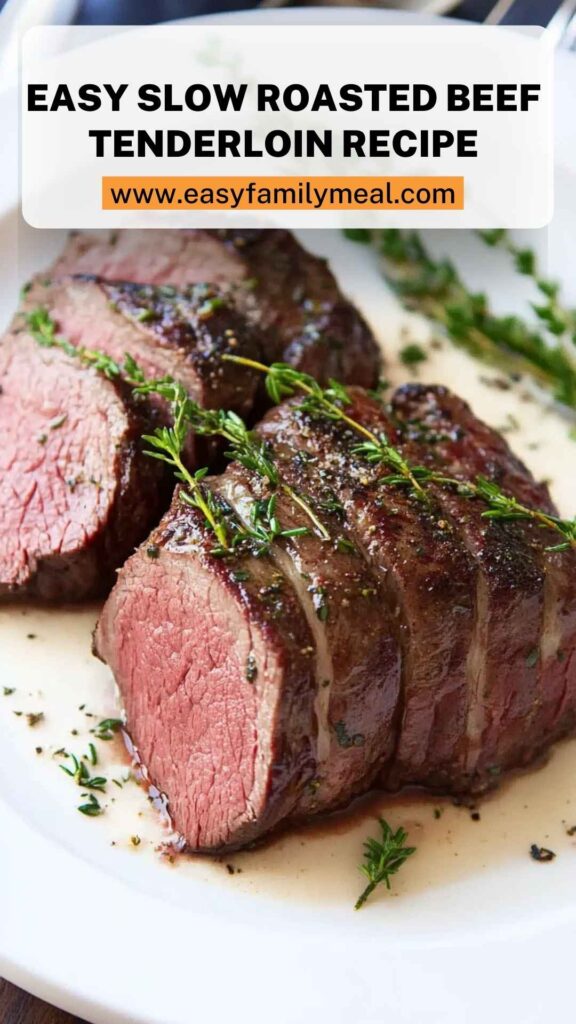
Easy Slow Roasted Beef Tenderloin Recipe – Easy Family Meal
Description
There's something undeniably special about sitting down to a beautifully roasted beef tenderloin. Picture the aroma wafting from the oven as guests gather around, eager to dig in. This dish is artfully simple yet decadently rich, perfect for any occasion.
Whether it’s a cozy family dinner or a festive gathering, roast beef tenderloin sets the scene. As a food enthusiast and registered dietitian, I've spent years perfecting this recipe, turning it into a go-to favorite that never fails to impress.
Let’s explore how easy it can be to prepare this culinary delight!
Ingredients
Instructions
Step 1: Preheat Your Oven
-
Begin by preheating your oven to 250°F (120°C). A lower temperature is key for that melt-in-your-mouth texture.
Step 2: Prepare the Beef Tenderloin
-
Trim any excess fat from the beef tenderloin. This not only prevents flare-ups in the oven but also ensures the beef doesn’t turn greasy. Season generously with kosher salt and black pepper to enhance flavor.
Step 3: Sear the Beef
-
In a large skillet or cast-iron pan, heat 2 tablespoons of ghee over medium-high heat. Once melted, add the tenderloin. Sear on all sides until golden brown, about 2-3 minutes per side. This step is crucial as it locks in juices and adds depth of flavor.
Step 4: Add Shallots and Rosemary
-
Once the tenderloin is seared, remove it from the heat. Add the chopped shallots and rosemary sprigs around the beef in the skillet. The shallots will cook and impart sweet flavor during roasting.
Step 5: Coat with Mustard and Ghee
-
Brush the tenderloin with Dijon mustard, then drizzle the remaining ghee over it. This not only enhances the taste but also helps create a lovely crust.
Step 6: Roast in the Oven
-
Transfer the skillet to the preheated oven. Roast the beef tenderloin slowly until it reaches an internal temperature of 125°F (52°C) for medium-rare. This usually takes about 1 to 1.5 hours, depending on the thickness of the meat.
Step 7: Rest the Meat
-
After roasting, remove the beef from the oven and allow it to rest for at least 15-20 minutes. Resting is vital; it helps redistribute the juices, ensuring each bite is juicy and tender.
Step 8: Slice and Serve
-
When ready, slice the tenderloin into medallions. Serve this delicious roast with flaked sea salt, freshly chopped tarragon, and your homemade horseradish cream sauce.
Nutrition Facts
Servings 6
- Amount Per Serving
- Calories 487kcal
- % Daily Value *
- Total Fat 28.8g45%
- Saturated Fat 14.4g72%
- Trans Fat 1.5g
- Cholesterol 146mg49%
- Sodium 209mg9%
- Total Carbohydrate 23g8%
- Dietary Fiber 1g4%
- Sugars 17g
- Protein 35g70%
* Percent Daily Values are based on a 2,000 calorie diet. Your daily value may be higher or lower depending on your calorie needs.
Note
- Choose the Right Cut: Selecting a good quality center-cut beef tenderloin ensures better flavor and texture.
- Use a Meat Thermometer: Avoid overcooking by keeping an eye on the internal temperature.
- Low and Slow: Resist the urge to crank the heat; patience is your friend for this recipe.
- Resting is Key: Always let the meat rest before slicing to maintain moisture.
- Experiment with Flavors: Incorporate different herbs like thyme or garlic for variety.



